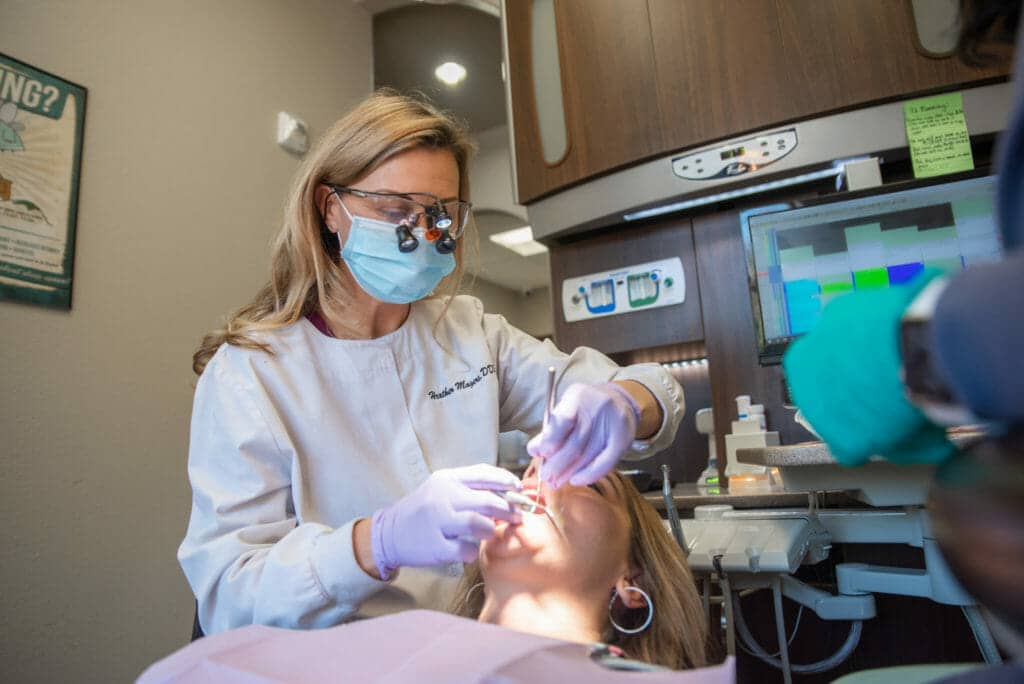
SEDATION DENTISTRY IN BURLESON, TX
Take the anxiety out of your dental visit.
At Legacy Dental, our experienced dentists provide specialized care for all our patients with their comfort in mind. As such, we offer in-house sedation dentistry in Burleson, TX, for most procedures, upon request. If you plan on requesting sedation dentistry, we ask that you have a trusted friend or family member accompany you to your appointment, as well as drive you home.
Why Consider Dental Sedation?
Choosing to have sedation during your treatment provides the following benefits:
- Most relaxing experience possible
- An environment where our specialists can work more efficiently
- Opportunities to complete your treatment in one appointment
- Solutions for individuals with dental anxiety and/or phobia
If you’re curious about whether sedation is appropriate for your particular situation, just ask us! We’re happy to answer any questions that you might have.
Types of Sedation Offered
Various types of sedation are tailored to suit different levels of anxiety and types of procedures. Here’s an overview of the types of sedation our dental office provides under the expert care of Dr. Magers and Dr. Barroso, and the procedures they are best suited for:
Laughing Gas (Nitrous Oxide)
Laughing gas, or nitrous oxide, is a mild sedative that is inhaled through a mask placed over the nose. It helps patients relax and diminishes pain sensitivity, but they remain awake and can communicate with the dentist. The effects of the gas wear off quickly once the mask is removed, allowing patients to recover rapidly without lingering drowsiness.
This type of sedation is ideal for patients with mild anxiety or for short, less invasive procedures such as dental cleanings, fillings, and minor tooth extractions. It’s also a good option for patients who need to drive themselves home after the appointment.
Oral Sedation
Oral sedation involves taking a prescribed sedative pill about an hour before the dental procedure. The medication induces a state of moderate sedation, where patients feel significantly relaxed and may even be groggy. While under oral sedation, patients can still respond to verbal cues from the dentist, but they may have little to no memory of the procedure afterward.
Oral sedation is suited for patients with moderate anxiety or those undergoing longer dental procedures that might not be as invasive. These can include more extensive dental cleanings, root canal treatments, and some cosmetic dentistry procedures. Patients will need someone to drive them home after the procedure due to the lingering effects of the sedation.
IV Sedation
IV sedation involves administering sedative drugs directly into the bloodstream through a vein, offering the dentist precise control over the level of sedation. This method can induce a deep sedation state, where patients are on the edge of consciousness but can still be awakened if necessary. Recovery from IV sedation takes longer, and patients will have no memory of the procedure.
This type of sedation is best for patients with severe dental anxiety, those undergoing lengthy or complex procedures such as wisdom tooth extraction, dental implant placements, or extensive reconstructive or cosmetic dental work. Due to the deep sedation, patients will require monitoring and assistance going home.
Choosing the Right Sedation
Dr. Magers and Dr. Barroso would consider several factors when recommending the most appropriate sedation method, including the patient’s level of anxiety, the complexity and duration of the dental procedure, and the patient’s health history. During a pre-procedure consultation at Legacy Dental, they would discuss these options to ensure that patients are fully informed and comfortable with their sedation choice. This personalized approach ensures that each patient receives the care that best suits their needs, making their dental experience as comfortable and anxiety-free as possible.
How Does It Work?
All dental sedation patients are carefully screened and a thorough medical history is completed prior to administering any type of sedative medication. Please plan to bring a list of all medications that you take (prescription or over the counter, including supplements) as well as disclose underlying medical conditions that you may have. Even if you feel it is not significant, there are contraindications for certain health issues that we should be made aware of; your privacy and confidentiality is respected at all times.
It can take a few hours after the procedure for the sedatives to completely wear off. Plan to wear comfortable, loose clothing, and dress in layers. We’ll give you a medication that’s taken by mouth just before your scheduled treatment. Gradually, you’ll start to feel sleepy or like you’re daydreaming.
During sedation, you’ll remain semi-conscious, being able to respond to basic questions and instructions (such as “open” or “close”) but sleepy enough that you’re not quite aware of what’s going on around you.

Are You A Good Candidate For Sedation Dentistry?
It’s quite routine for our specialists to provide sedation during dental treatments, such as wisdom tooth extraction, dental implants, or root canals. However, sedation isn’t restricted to just these particular treatments. We also offer it as a solution to anyone that wants to feel more relaxed, overcome dental phobia, or simply “nap” through the visit for a more efficient experience.
To learn more about dental sedation, call our office or schedule a consultation!
